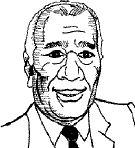
Hartley Neita
IN MAY 1948, Field Marshal Jan Smuts who had been South Africa's Prime Minister since 1939, and his mainly English-speaking United Party, were defeated in General Elections by the race segregationist Nationalist Party. Candidates and members of this latter party were Afrikaans-speaking whites who supported Adolph Hitler and the Nazi party in Germany during the recently ended World War.
It did not take long for this new Government to begin the process of dividing South Africa into two basic human groups. The favoured were the whites. From then on they enjoyed all the luxuries of wealth and power. The blacks, although the majority, became the wretched poor. There was, also another group, the minority Indians and the coloureds. It did not take long for Jamaicans to become angry at the treatment of their black brothers and sisters in this far away country. Jamaican men had already faced white prejudice in England especially after the world war ended and English soldiers had returned from the mud and blood of Europe to find that the now demobbed Jamaican Royal Air Force flyers and munitions factory workers had wooed and won their wives and sweethearts. That became an excuse for savage and bloody fights between both groups.
VICIOUS HATRED
In the United States, too, Jamaicans like the Rev. Amos Carnegie had suffered from the vicious hatred of southern racists who beat him because he refused to take a back seat on a bus travelling through Georgia one night. And there were many others like him. So in August 1950, the Jamaica Council for Human Rights, which had an international outlook, moved a motion at its first meeting calling on the Jamaican Government "to ban the importation of goods from South Africa as a mark of protest against the segregation policy recently adopted by that Government". Some nine months later, the elected members of the then Executive Council decided that "the policy being pursued by the South African Government towards its black citizens was not compatible with the best ideals of the British Commonwealth".
They therefore cabled the Secretary of State for the Colonies asking him to impose a ban on the importation of goods from that country. At that time, Jamaica did not have the international constitutional authority to decide with whom Jamaica could trade. That authority rested with Britain. Just about then, Dr. Marcus James, a Jamaican-born Anglican Priest, used the opportunity when he was invited to preach in the pulpit of the St. Paul's Cathedral in London, England, to hit out at South Africa's apartheid policy. The former Kingston College student (who was trained by Canon Percival Gibson, and who also had a tart tongue), described South Africa's Premier, Dr. Daniel Malan as "proving to be Adolph Hitler's successor as the world's High Priest of racial hate, intolerance and oppression, deluded by messianic pretensions and propagating his vile unscientific doctrine of the white South Africans as the Master Race."
James was the first black man to preach in this ancient cathedral, and reports from England were that his comments did not go well with the Church establishment. Five years later, Councillor A.T. Dudley Kelly of the Clarendon Parish Council moved a motion calling "for a ban on all imports from South Africa by Jamaica as a demonstration of disgust at the racist policy of that Government". The motion was unanimously adopted and it was decided to copy the resolution to all Parish Councils, all Christian bodies, and to the Colonial Secretary for transmission to the British Secretary of State for the Colonies, and the Secretary-General of the United Nations.
RACIAL POLICY
Two years later, the Minister of Trade and Industry, Wills O. Isaacs, announced that the Government of Jamaica had decided to ban the importation of all goods from South Africa to protest against that country's racial policy which it considered "revolting to the conscience of decent people throughout the world". It was a bold but token gesture. At that time, of the 15-million pounds worth of goods imported by Jamaica, only 238,000 pounds sterling came from South Africa. And only a little more than 14,000 pounds worth of Jamaican goods were exported to South Africa. But this action, taken by what the South African Government thought was a little impertinent piece of earth peopled by mainly petty-fogging black people, had a ripple effect which made its leaders angry. Next week we will remember how they reacted.











